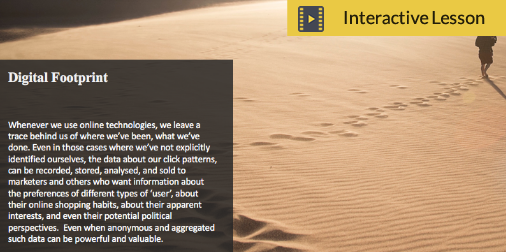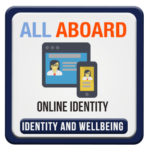Managing your online identity & reputation
Protecting yourself and others and behaving in a safe and ethical manner online
Content & learning objectives
By simply using online tools and resources, we leave behind a trace of our activity that can be used to draw conclusions about our lifestyle and views. In addition, by using social media we project an image of ourselves to an audience that might be wider than we realise, and we might also be opening ourselves up to the possibility of harassment or mis-representation.
In this lesson we’ll explore these issues and show how you can use social media to promote your professional identity and interests more positively.
Click on the image to take our interactive online lesson and if you successfully complete it and the associated quiz, you can earn a digital badge.
Resources for learners, trainers, and developers
Are there badges available for this topic?
Yes. There is a basic knowledge badge, awarded to anyone who successfully completes the online lesson and quiz. There is scope to develop a set of criteria for more advanced badges based on participation in workshops and courses, many of which are offered by educational institutions. Note also that there are many other relevant stations on this metro line which deal with related topics, each of which has its own corresponding badge.
How can we run a workshop or classroom session on this topic?
There are several topics covered in this theme, many of which can be discussed and explored in detail in workshop or training sessions. Activities around aspects of digital footprints, social media use and guidance, protecting yourself against harassment, promoting your own profile using LinkedIn and other professionally-oriented tools.
Are there resources and materials available?
Yes. We have collated some useful links for you (opposite) but you will also find many other sources of advice and guidance on the whole range of topics covered in this lesson. Additional materials can also be found in other stations on this line. A simple checklist and activity sheet for some of the items covered here (which is linked to in the online lesson) is also available here.
Can I download a copy of this interactive lesson?
Yes. We provide all the materials which we have developed (or adapted, subject to licence permissions) for use under a CC BY-NC 4.0 licence. A SCORM package can be downloaded by clicking here.
Further information & useful links:
Edinburgh University’s ‘Managing your digital footprint’ service: http://www.ed.ac.uk/institute-academic-development/about-us/projects/digital-footprint
“How to manage your social media privacy settings” Useful guide from the Center for Identity (University of Texas at Austin): https://identity.utexas.edu/everyone/how-to-manage-your-social-media-privacy-settings
Cyberbullying, help and advice from Reachout.com Ireland: http://ie.reachout.com/inform-yourself/bullying-and-personal-safety/cyber-bullying/
Take back the tech – a rich set of resources, advice and information focused around ending violence against women, including online harassment and stalking.: https://www.takebackthetech.net/
Ireland’s Office for Internet Safety: http://www.internetsafety.ie/website/ois/oisweb.nsf/page/safety-en
You might also find “A Domain of One’s Own” a useful and interesting approach to developing your own online identity: https://www.allaboardhe.ie/domain/
Additional Acknowledgements:
In addition to the sources listed in the online lesson, we would like to acknowledge useful discussions and advice on aspects of this broad topic from Louise Connelly and Nicola Osborne (Edinburgh), Jane Secker (LSE), Helen Beetham, Sarah Knight, David White, Donna Lanclos, and Catherine Cronin.


